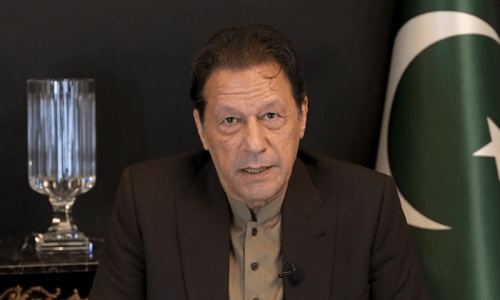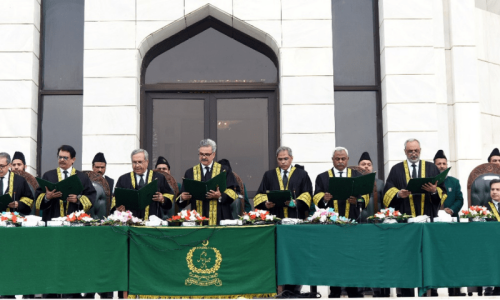ISLAMABAD: Amid ongoing talks with the International Monetary Fund (IMF) in Doha, the government seeks to present the federal budget 2022-23 in the National Assembly on June 10.
“The annual budget for FY2022-23 along with the Finance Bill 2022 is scheduled to be presented in the National Assembly of Pakistan on Friday, June 10, 2022,” Secretary Finance Hamed Yaqoob Sheikh has informed the relevant authorities conveying the approval of the prime minister of the budget schedule.
Mr Sheikh also asked Secretary Cabinet Division that “a special budget meeting of the federal cabinet may kindly be convened for the consideration of the budgetary proposals”.
Sources said the government would be convening key meetings relating to the federal budget, starting with the Annual Plan Coordination Committee (APCC) in the first week of June to finalise about Rs700bn worth of development programme excluding allocations for provincial projects under 16 devolved ministries.
The meeting of the National Economic Council is being contemplated for June 7, followed by a special cabinet meeting on the budget on June 10.
Sources said the talks with the IMF mission in Doha had discussed the fiscal framework for the next year based on which the next year’s federal development programme could not afford more than Rs700bn, otherwise the burden of taxation would have to be increased.
The sources said the finance secretary had joined the IMF talks and had conveyed the government’s commitment to gradually eliminating fuel and electricity subsidies within a period of 45 days to two months to avoid a sudden shock to the people.
This would, however, be done under an agreed subsidy reduction plan. Finance Minister Miftah Ismail and Minister of State for Finance Dr Aisha Ghaus-Pasha would be joining the talks on Monday.
These sources said the first part of the subsidy reduction plan would come into force by next Monday next, particularly ahead of the conclusion of policy-level talks with the IMF on Wednesday.
These sources said the current fiscal year was being considered as a bygone conclusion with a record fiscal deficit in which the current government wanted to park the cost of all decisions of the previous government into the current year. However, the IMF wanted the measures relating to subsidy reduction to be in place before concluding the ongoing talks on a positive note.
The sources said the authorities have also shared a tentative plan for divesting shares and privatising public sector entities, particularly the energy sector companies, to reduce the federal budget’s continuous burden and use their proceeds to finance the fiscal deficit.
The schedule would be finalised in consultation with the IMF and the World Bank and made part of the agreement as structural benchmarks.
The government has already banned the import of luxury items and would follow up with subsidy reduction to contain twin deficits — fiscal and external — to secure an economic bailout from the IMF.
Mr Miftah has assured the fund to take tough decisions, undertake reforms committed in the original fund programme by the PTI government and complete structural benchmarks. These steps were considered important to clear the backlog of structural benchmarks.
The two sides have generally agreed that the extension in time by one year and increase in the size of the programme by $2bn be linked to strategic structural benchmarks that address the root causes rather than delivering on fiscal targets. They also agreed that there was no point in setting benchmarks under which basic challenges remain unaddressed and come back again and again despite painful measures.
It was thus agreed to set the privatisation of power companies and other loss-making state-owned enterprises as a structural benchmark in the revised and upgraded fund programme to $8bn so that circular debt flow is addressed forever and debt stock is dissolved through privatisation proceeds.
Published in Dawn, May 21st, 2022














































